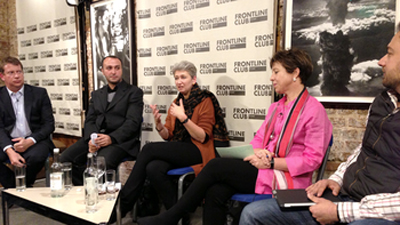Libya: A Failed State?
Is Libya on the brink of becoming a failed state? Three years after Nato-backed rebels overthrew Muammar Gaddafi and the country was held up as the success story of the Arab Spring, Libya is deeply divided.
The fragile government, which has seen three prime ministers since March, has been unable to impose authority on militia groups who refuse to disband. Power, fuel and water shortages disrupt daily life, the economy has not been restored, and the planned new constitution remains as yet unwritten.
As Libya’s parliament calls for foreign intervention to protect civilians from deadly clashes between rival militia groups, we will be asking what has gone wrong in the country. Where do the divisions lie and what can be done to pull the county away from becoming a failed state? We will be examining what the role of the international community should be in supporting Libya in its transition to democracy.
Chaired by Lindsey Hilsum, international editor at Channel 4 News and author of Sandstorm; Libya in the Time of Revolution.
The panel:
Huda Abuzeid is a filmmaker and TV producer who has been based in Libya since the start of the revolution in 2011. She is currently the director of the Rashad Foundation, a Tripoli based NGO, which initiates projects to support Libya’s transitional process.
Chris Stephen, Libya Correspondent for The Guardian and author of Judgement Day: The Trial of Slobodan Milosevic.
Ghazi Gheblawi, a writer, surgeon, public speaker and the editor of el-Kaf online newspaper on Libyan affairs.
Hassan al-Amin, a human rights activist and founder of Libya al-Mostakbal (The Future Libya). He is a former member of Libyan General National Congress and head of its Human Rights Committee.
Photograph: rm / Shutterstock.com


